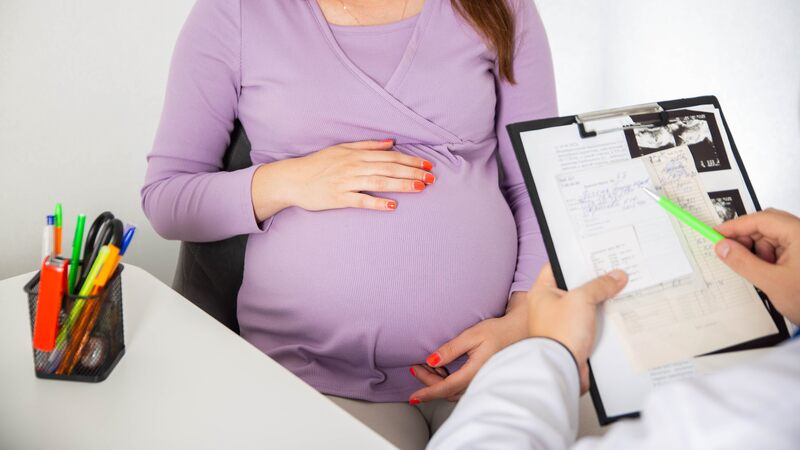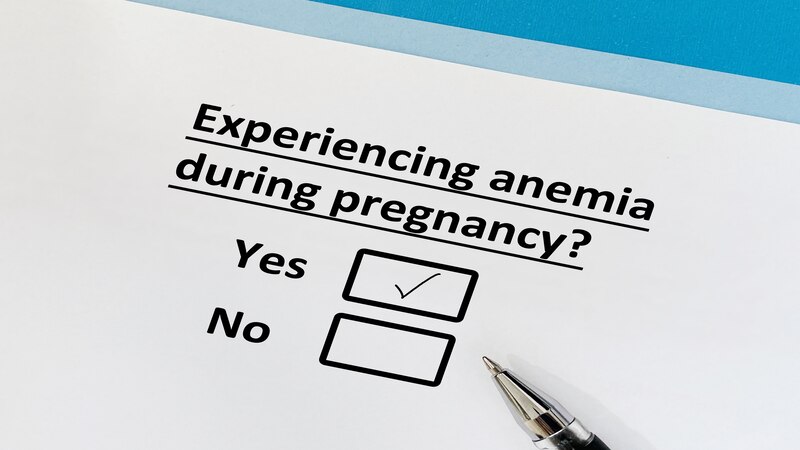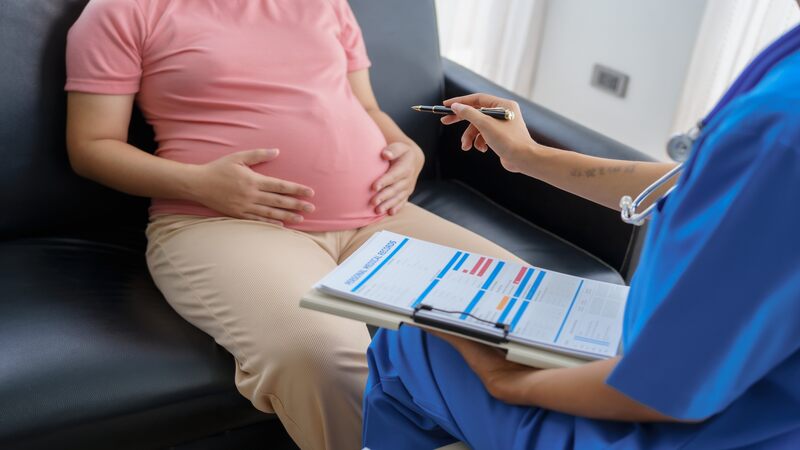
Over a third of women of reproductive age worldwide suffer from anemia, a condition in which the body’s red blood cell count is too low to meet its physiologic needs for oxygen delivery. Anemia means a lack of blood. It occurs when the concentration of the red blood pigment, hemoglobin, falls below normal levels. Anemia during pregnancy is very common.
Hemoglobin is found inside red blood cells and carries oxygen around the body. Its deficiency brings about many issues during pregnancy. There is a correlation between gestational age and the likelihood of anemia, and during the third trimester, many pregnant women are iron-deficient, which may lead to both maternal and fetal complications.
What Is Anemia?
According to the World Health Organization (WHO), anemia is a medical condition with less than normal hemoglobin or red blood cell count (1).
Men are considered anemic if the hemoglobin level is less than 13.5 g/dL while women are anemic if the hemoglobin content is below 12 g/dL of blood (2).
Hemoglobin is the pigment that is responsible for giving the red color to the blood and carries oxygen from the lungs to the various tissues and organs of the body.
Is Anemia Common During Pregnancy?

During pregnancy, your blood volume increases, and the amount of iron you need also increases, which is required to supply oxygen to the growing fetus. Hence, a pregnant woman needs more iron than a normal human body requires, and it is important to take 30 mg of iron daily during pregnancy to meet all the requirements (3).
According to the WHO, Anemia in pregnancy is defined as hemoglobin levels less than 11 g/dL (4). There are many types of anemia, but iron deficiency anemia is usually seen during pregnancy. Iron is mandatory for the synthesis of hemoglobin, which is required for red blood cell production in the human body.
Causes of Anemia During Pregnancy
During pregnancy, the volume of blood in your body increases by as much as a third. The usual form of anemia is a lack of iron. Iron is essential to produce hemoglobin in the body. However, three main causes can categorize a pregnant woman as anemic.
- Iron deficiency anemia, caused due to a deficiency of iron in the body.
- Folate-deficiency Anemia, Folate is folic acid and is a kind of vitamin B. It is required for producing red blood cells.
- Vitamin B12 deficiency-This type of Anemia occurs due to a deficiency of folate and vitamin B12.
Iron supplements are no longer given routinely. However, as the body becomes more efficient at absorbing and using iron during pregnancy, your losses decrease as menstruation has temporarily ceased.
Symptoms Of Anemia During Pregnancy

Here are the common and frequent symptoms that are seen if you have iron deficiency anemia during pregnancy.
- Fatigue and tiredness
- Palpitations and breathlessness
- Pale nail beds and eyelids
- Dizziness
- Loss of concentration
- Spoon-shaped nails in severe deficiency
- Strange taste in the mouth
- Sore tongue
- Headache
- Tinnitus
- Sometimes unusual cravings
- Worsening of heart problems
- Hair loss
When Anemia occurs, body tissues may not get enough oxygen for their needs, and symptoms of paleness, dizziness, tiredness, lack of energy, shortness of breath during exercise, headaches, and even palpitations can occur.
A common symptom of iron deficiency during pregnancy is a craving for strange foods such as soil (5). This is known as pica. If pica happens to you during pregnancy, your doctor may want to perform a blood test to check your iron stores. They may also put you on iron supplements.
Some Common Types of Anemia
It is vital to have a balanced diet during pregnancy to avoid getting diagnosed with anemia. Here are some common types of Anemia seen during pregnancy
1. Iron Deficiency Anemia
This kind of anemia develops when the body doesn’t have iron to produce an adequate amount of hemoglobin, a blood protein, that aids in transporting oxygen from the lungs to the rest of the body. This is the most common form of anemia during pregnancy.
2. Folate Deficiency
This type of anemia occurs when there is an insufficient amount of folate, a B vitamin in your body. Since folate deficiency can result in fewer red blood cells to transport oxygen throughout the body, such a form of anemia can result in birth defects such as spina bifida and low birth weight (6).
[Read : Folic Acid During Pregnancy]
3. Vitamin B12 Deficiency
Vitamin B12 is vital to keep the blood cells in the body healthy and maintain a healthy nervous system. This kind of anemia occurs in women whose diet does not include meat, eggs, poultry, and dairy products. This form of anemia during pregnancy could also result in neural tube abnormalities as well as possible preterm labor.
Risk Factors For Developing Anemia During Pregnancy

The following conditions can aggravate the chances or vulnerability of developing Anemia
- Women having multiple pregnancies
- Women experiencing too much vomiting during pregnancy
- Teenage pregnancy (7)
- Women with decreased appetite
- Consuming an inadequate diet
- Women having hemorrhoids
If you experience tiredness or difficulty breathing, immediately consult your doctor. Do not neglect it as it can be an alarming sign of a falling hemoglobin level.
Side Effects of Anemia in Pregnancy
Mild Anemia is usually not of much concern in pregnancy. Severe Anemia can lead to the following risks if left untreated (7a)
- Preterm labour
- Low birth weight of baby (8)
- Baby born with Anemia
- Developmental delays in the baby
- Postpartum depression
- Neural tube defects and spina bifida in cases of folate deficiency Anemia.
- The need for blood transfusions can lead to transfusion reactions and infections.
- Postpartum hemorrhage
- Preeclampsia
What Happens To The Baby If The Mother Is Anemic?

A baby’s healthy development depends on your adequate consumption of iron, vitamin B12, and folic acid when pregnant. You should know that anemia might harm your baby’s development, especially in the first trimester.
Untreated anemia increases the likelihood that your newborn will also be anemic, which can have negative effects on development.
The likelihood of having a premature delivery and a kid with a low birth weight is also raised by anemia. Animal studies have also indicated that a mother’s risk of having a child born with a heart abnormality is considerably increased if she is highly iron-deficient and anemic during the first trimester.
Prevention of Anemia During Pregnancy
Anemia is a pretty common complication during pregnancy. Physiological Anemia is mild and results from a dilution of blood. Much more severe Anemia results from a deficiency of iron and other vitamins. These causes are preventable by taking replacement pills.
- Iron deficiency anemia can be prevented by taking regular oral iron supplements daily. It is easily preventable by taking a diet rich in iron. They include dark green leafy vegetables, meat, eggs, fish, and fortified grains.
- Anemia due to vitamin B12 deficiency can be prevented by taking vitamin B12 supplements.
- Anemia due to folic acid deficiency requires folic acid supplements. Folic acid supplements during pregnancy also reduce the risk of neural tube defects in the fetus.
- Also, avoid the intake of tea and coffee after food, as it interferes with iron absorption in the body.
Treatment For Iron Deficiency Anemia During Pregnancy

A healthy intake of iron helps to prevent iron deficiency anemia. When eating iron-rich foods or taking iron supplements, wash them down with orange juice as vitamin C helps to ensure optimum absorption of dietary iron from the intestines.
Other treatments for iron deficiency anemia during pregnancy are
1. Supplement
Taking a supplement specially formulated for pregnancy that contains iron, folic acid, and vitamin B12 will help to reduce the risk of anemia. Follow your doctor’s instructions for taking prenatal vitamins without fail.
2. Naturopathy
A naturopath takes a holistic view of the patient and treats the underlying cause of the issue with only natural approaches. It includes using cast-iron skillets when cooking (the cooked food absorbs iron). Drinking beet juice for the same purpose of blood-building.
3. Have Iron-rich Foods
You can make up for the iron deficiency by consuming plenty of iron-enriched foods.
When Should You Consider Seeing A Doctor?
If hemoglobin is less than 11.5 g/dL at the beginning of pregnancy then it is better to start the workup for anemia. Consult with your doctor regarding Anemia if you experience persistent fatigue, dizziness, unintended movement in your lower legs, breathlessness, a rapid heart rate, pale skin, or any other symptoms of anemia.
So, following a good lifestyle and having an iron-rich diet can help prevent Anemia during pregnancy. A good hemoglobin level is essential for the well-being of both the mother and the developing baby. Do not hesitate to talk to your healthcare provider about the need for iron and vitamin supplements.
FAQ’s
1. What Is Considered Severe Iron Deficiency Anemia In Pregnancy?
Anemia is considered severe when your complete blood test report shows a hemoglobin level of 6.5 to 7.9 g/dL.
2. Which Trimester Is Iron Most Important?
Very low iron levels contribute to impaired fetal growth and an increased likelihood of preterm birth. The last ten weeks of pregnancy are crucial for iron consumption because that is when your baby starts to accumulate iron in preparation for the first six months of life.
3. Can an Anemic Person Give Birth?
Yes. But, babies born to anemic mothers are more than twice as likely to be born prematurely and three times as likely to be born weighing less than five pounds. Untreated anemia increases the likelihood that your newborn will also be anemic, which can have negative effects on development.
4. What is a Normal Iron Level in Pregnancy?
The need for iron supplementation increases in pregnancy for the proper growth of the fetus. The normal range of iron in a non-pregnant woman is around 40-140 mcg/dL. In the first trimester, the serum iron value should be around 72-143 mcg/dL. In the second trimester, the normal range is 44-178 mcg/dL, and in the third trimester, it is around 30-193 mcg/dL.
5. What is a Low Hemoglobin Level in Pregnancy?
Usually, any hemoglobin level less than 11 g/dl is considered low during pregnancy. In the first trimester, any value less than 11g/dL is considered low. In the second or third trimester, values less than 10.5 or 11.0 g/dL are considered low.
6. What Food is Highest in Iron?
Food contains two types of iron- heme and non-heme. Heme iron is present in meat like beef, chicken, lamb, and fish. It is readily available for absorption in the body. Non-heme iron is found in plant-based foods like green leafy vegetables, tomatoes, citrus food, kale, and beans.
7. How Can I Increase My Hemoglobin During Pregnancy?
Consuming iron-rich foods like meat, eggs, and green leafy vegetables can help in increasing low levels of hemoglobin. Intake of vitamin C in the form of citrus foods can be really helpful. Avoid tea and coffee as much as possible.
References
- Anaemia, World Health Organization – https://www.who.int/news-room/fact-sheets/detail/anaemia
- Anemia, American Society of Hematology – https://www.hematology.org/education/patients/anemia
- Institute of Medicine (US) Committee on Nutritional Status During Pregnancy and Lactation. Nutrition During Pregnancy: Part I Weight Gain: Part II Nutrient Supplements. Washington (DC): National Academies Press (US); 1990. 14, Iron Nutrition During Pregnancy – https://www.ncbi.nlm.nih.gov/books/NBK235217/
- Moghaddam Tabrizi F, Barjasteh S. Maternal Hemoglobin Levels during Pregnancy and their Association with Birth Weight of Neonates. Iran J Ped Hematol Oncol – https://www.ncbi.nlm.nih.gov/pmc/articles/PMC4779156/
- Iqbal, Hana; Khan, Batool; Siddiqui, Sabila; Ahmed, Hafez1. Epidemiology of Pica amongst Pregnant Women and its Clinical, Psychological, Basic Science, Realities and Myths in UAE. Hamdan Medical Journal 16(3):p 173-176, Jul–Sep 2023. – https://journals.lww.com/hmmj/fulltext/2023/16030/
- Folic Acid, CDC – https://www.cdc.gov/folic-acid/
- Abu-Ouf NM, Jan MM. The impact of maternal iron deficiency and iron deficiency anemia on child’s health. Saudi Med J. 2015 Feb;36(2):146-9 – https://www.ncbi.nlm.nih.gov/pmc/articles/PMC4375689/
- Lindsay H Allen, Anemia and iron deficiency: effects on pregnancy outcome123, The American Journal of Clinical Nutrition, Volume 71, Issue 5, 2000, Pages 1280S-1284S, ISSN 0002-9165 – https://www.sciencedirect.com/science/article/pii/S0002916523071563
